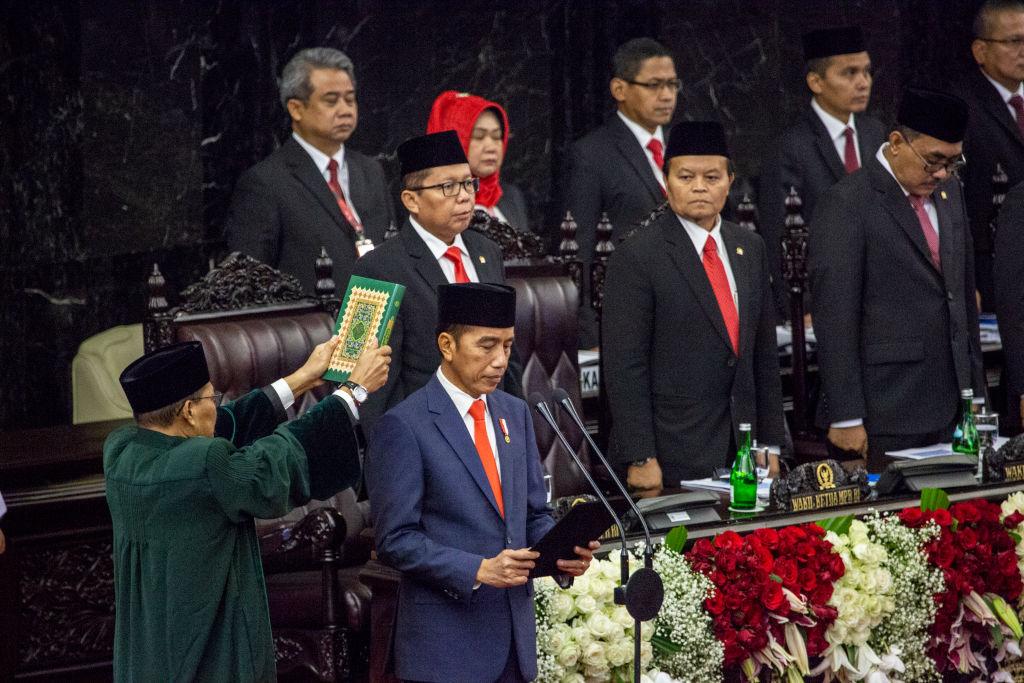
Despite the substantial transformation in Indonesia’s political system, there’s more continuity than change in Indonesia’s security outlook and strategic culture.
Since its early years, Indonesia has developed strategic doctrines that include the concept of a total people’s war, the archipelagic outlook, and the concept of national resilience. Indonesia’s free and active foreign policy doctrine forbids the country from entering into any military alliances or hosting a foreign military base on its territory.
After suffering colonialism and foreign interventions, Indonesia has developed a strong sense of nationalism and a deep-rooted suspicion of major powers’ intentions.
Even as Indonesia transformed from authoritarianism to democracy in the past two decades and ended the military’s dual-function role, the inward-looking strategic culture has not really changed. Internal security threats and challenges have continued to be regarded as the more immediate and present danger than external ones.
Changes in the strategic environment have nonetheless led to important shifts in Indonesia’s regional policy and the management of relations with major powers. Of particular note has been the shift from seeking to insulate Southeast Asia from harmful external influences by keeping the major powers at bay, to actively engaging with the major powers and widening the locus of regional activities, while still ensuring the strategic autonomy and centrality of ASEAN.
At least five factors drive this policy change.
First, the emergence of China as a new economic superpower has transformed Indonesia’s perception of this country from an ideological threat to an important economic partner. The two countries have become comprehensive strategic partners and China is now Indonesia’s top export destination and source of investment.
At the same time, China’s growing military might and assertive policy in the disputed South China Sea, which impinges on Indonesia’s exclusive economic zone around the Natuna Islands, have raised concerns in Jakarta. The need to manage relations with China, maximising the potential benefits and mitigating the attendant risks, is arguably the most important driver shaping Indonesia’s regional outlook and policy initiatives.
The second driver for change is India’s economic rise, its eastward-oriented policy, and its growing weight as an Indian Ocean power, all of which have made Indonesia pay more attention to India for both economic and strategic reasons.
Third, the return of great-power rivalry, in particular the rivalry between the United States and China, which has the potential to destabilise regional peace and stability, is naturally of great concern to Indonesia as well as ASEAN as a whole.
Fourth, the Asian financial crisis and the emergence of various transnational and non-traditional security threats that have affected countries across regions have shown that the wellbeing of Southeast Asia cannot be separated from that of its neighbouring subregions.
Fifth, the growing importance of the maritime domain, particularly for geostrategic and geoeconomic reasons, has given more salience to Indonesia’s position as an archipelagic state straddling the Indian and Pacific oceans.
Indonesia’s thickening economic ties with countries in the Indo-Pacific further strengthen its desire to see the region remain peaceful and stable.
While during the first few years of his first term, President Joko Widodo (Jokowi) prioritised bilateral relations that could yield immediate results, the rising discourse on the Indo-Pacific with several contending visions prompted the Indonesian government again to take the lead in promulgating a joint ASEAN response and exercising its middle-power statecraft.
Concerns about the growing polarisation brought about by the US–China rivalry—with consequences that included mounting pressures on other countries to take sides and the possible marginalisation of ASEAN in the face of other Indo-Pacific initiatives, such as the US and Japanese free and open Indo-Pacific concepts—propelled Jokowi and foreign minister Retno Marsudi to push for the acceptance of an ASEAN vision statement that was open and inclusive.
The ‘ASEAN outlook on the Indo-Pacific’, endorsed at the ASEAN summit in June 2019, is aimed at promoting habits of dialogue and cooperation in mostly low-politics areas, reflecting Indonesia’s Kantian middle-power perspective on Indo-Pacific security dynamics.
Jokowi’s second-term cabinet was formed in late October 2019 and, besides the usual division of spoils among the political parties that supported him, the appointments also reflect the government’s preoccupation with internal security challenges, particularly radicalism and separatism.
Tito Karnavian resigned as the chief of police and was appointed as home affairs minister, the first time in Indonesian history that a police officer has held such a position.
Similarly, for the first time since the fall of Suharto, the minister for religious affairs is a retired army general. Retno Marsudi was retained as foreign minister, signalling continuity in Indonesia’s foreign policy stance, particularly a focus on economic diplomacy and a commitment to see the ASEAN outlook statement more widely accepted and implemented.
The appointment of Prabowo Subianto, who has twice run against Jokowi for the presidency, as minister of defence, however, has brought a measure of uncertainty into Indonesia’s security outlook.
In his presidential campaign, Prabowo displayed a rather xenophobic perspective in castigating Indonesia as a weak country highly vulnerable to external exploitation and intervention, and looked down upon by other countries.
Jokowi has stressed that ministers must follow and execute the vision of the president and vice president, not pursue their own individual visions. It remains to be seen to what extent Prabowo’s more strident nationalism will colour Indonesia’s security outlook, particularly in relation to the major powers.
At his first hearing in parliament as defence minister, Prabowo reiterated that Indonesia’s defence strategy is based on total people’s war, not just on its conventional military capability, which he characterised as still lagging behind that of other countries. These comments would suggest that Prabowo is likely to reinforce Indonesia’s mainly inward-looking strategic culture.